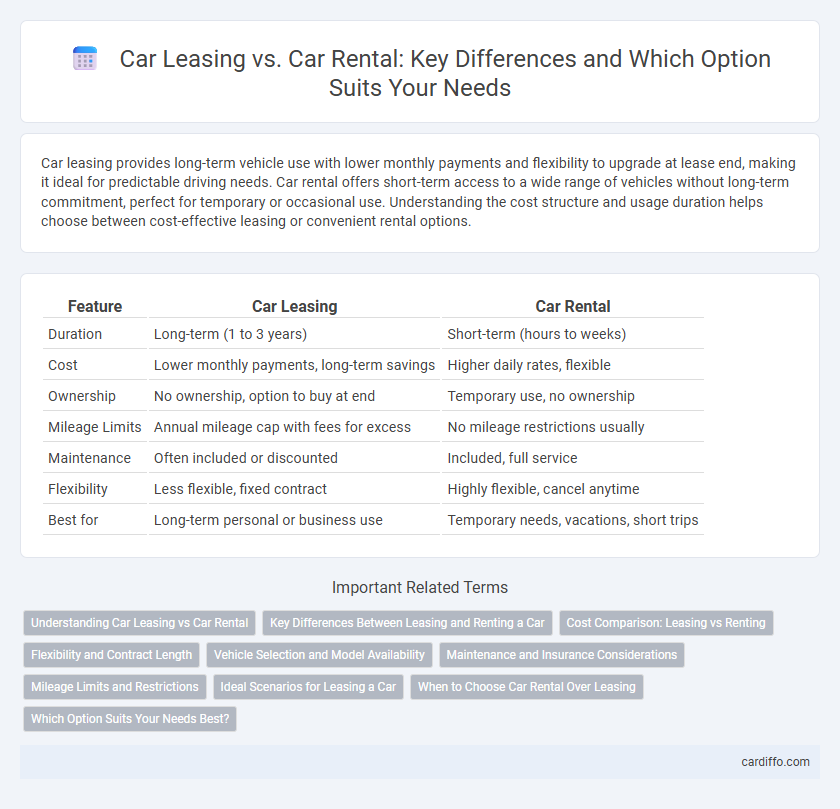Car leasing provides long-term vehicle use with lower monthly payments and flexibility to upgrade at lease end, making it ideal for predictable driving needs. Car rental offers short-term access to a wide range of vehicles without long-term commitment, perfect for temporary or occasional use. Understanding the cost structure and usage duration helps choose between cost-effective leasing or convenient rental options.
Table of Comparison
| Feature | Car Leasing | Car Rental |
|---|---|---|
| Duration | Long-term (1 to 3 years) | Short-term (hours to weeks) |
| Cost | Lower monthly payments, long-term savings | Higher daily rates, flexible |
| Ownership | No ownership, option to buy at end | Temporary use, no ownership |
| Mileage Limits | Annual mileage cap with fees for excess | No mileage restrictions usually |
| Maintenance | Often included or discounted | Included, full service |
| Flexibility | Less flexible, fixed contract | Highly flexible, cancel anytime |
| Best for | Long-term personal or business use | Temporary needs, vacations, short trips |
Understanding Car Leasing vs Car Rental
Car leasing involves long-term agreements typically lasting two to four years, offering lower monthly payments and the option to purchase the vehicle at lease end, making it ideal for those seeking consistent vehicle use without ownership. Car rental suits short-term needs, ranging from a day to a few weeks, providing flexibility and convenience without long-term commitment or maintenance responsibilities. Understanding these differences helps consumers choose based on their driving habits, financial goals, and usage duration.
Key Differences Between Leasing and Renting a Car
Car leasing typically involves long-term contracts, often spanning two to four years, with lower monthly payments but restrictions on mileage and vehicle modifications, while car rental offers short-term flexibility ranging from days to weeks without long-term commitments. Leasing usually requires maintenance responsibilities and potential fees for excessive wear and tear, contrasting with car rental services that cover maintenance within the rental period. Financially, leasing can be more cost-effective for those needing a vehicle over several years, whereas car rental suits travelers or individuals needing temporary transportation without credit checks or down payments.
Cost Comparison: Leasing vs Renting
Car leasing typically offers lower monthly payments compared to short-term car rentals, making it more cost-effective for long-term usage. Rental cars incur higher daily rates and potential fees for additional mileage, increasing overall expenses over time. Leasing contracts often include maintenance and warranty coverage, reducing unexpected repair costs compared to rental agreements.
Flexibility and Contract Length
Car leasing offers long-term flexibility with contract lengths typically ranging from 24 to 48 months, ideal for users seeking lower monthly payments and vehicle customization options. Car rental provides short-term flexibility with agreements often made on a daily to weekly basis, catering to temporary transportation needs without long-term commitments. Choosing between car leasing and car rental depends on desired contract duration and adaptability in usage.
Vehicle Selection and Model Availability
Car leasing offers a broader selection of newer vehicle models, often allowing customers to customize features and choose from various trims, making it ideal for long-term use and specific preferences. Car rental fleets typically focus on popular, standard models with limited customization and may have fewer options due to vehicle turnover and availability. Leasing provides access to the latest technologies and designs, while rentals prioritize convenience and short-term access to a reliable selection of cars.
Maintenance and Insurance Considerations
Car leasing typically includes maintenance packages covering regular servicing and repairs, ensuring consistent vehicle performance and reducing unexpected costs for the lessee. Insurance for leased vehicles often requires full coverage with higher premiums mandated by the leasing company to protect their asset. In contrast, car rentals usually incorporate basic insurance and maintenance within the rental fee, offering flexibility but less comprehensive long-term care compared to leasing agreements.
Mileage Limits and Restrictions
Car leasing typically includes mileage limits ranging from 10,000 to 15,000 miles per year, with fees applied for excess mileage, which can significantly impact overall costs. In contrast, car rentals usually offer more flexible mileage options, often providing unlimited miles or higher daily allowances, appealing to short-term users with varying travel needs. Understanding these mileage policies is crucial for consumers to balance cost efficiency against their driving habits when choosing between leasing and renting.
Ideal Scenarios for Leasing a Car
Leasing a car is ideal for individuals who prefer lower monthly payments and enjoy driving a new vehicle every few years without the commitment of ownership. It suits those who drive a consistent, moderate number of miles annually and want to avoid the hassles of depreciation and maintenance costs. Businesses often choose leasing for tax advantages and fleet management flexibility, making it a practical option for long-term use.
When to Choose Car Rental Over Leasing
Car rental is the ideal choice for short-term transportation needs, such as vacations, business trips, or temporary vehicle replacement during repairs. It offers flexibility without long-term financial commitments or credit checks, making it suitable for occasional drivers or those requiring immediate access to a vehicle. Car rental services typically include maintenance and insurance, reducing hidden costs compared to leasing agreements.
Which Option Suits Your Needs Best?
Car leasing offers long-term affordability and consistent monthly payments, ideal for individuals seeking new vehicles with lower upfront costs over several years. Car rental provides flexibility for short-term use, perfect for travelers or those needing a vehicle temporarily without long-term commitment. Choosing between leasing and renting depends on your duration of use, budget, and preference for vehicle ownership or temporary access.
Car Leasing vs Car Rental Infographic

 cardiffo.com
cardiffo.com